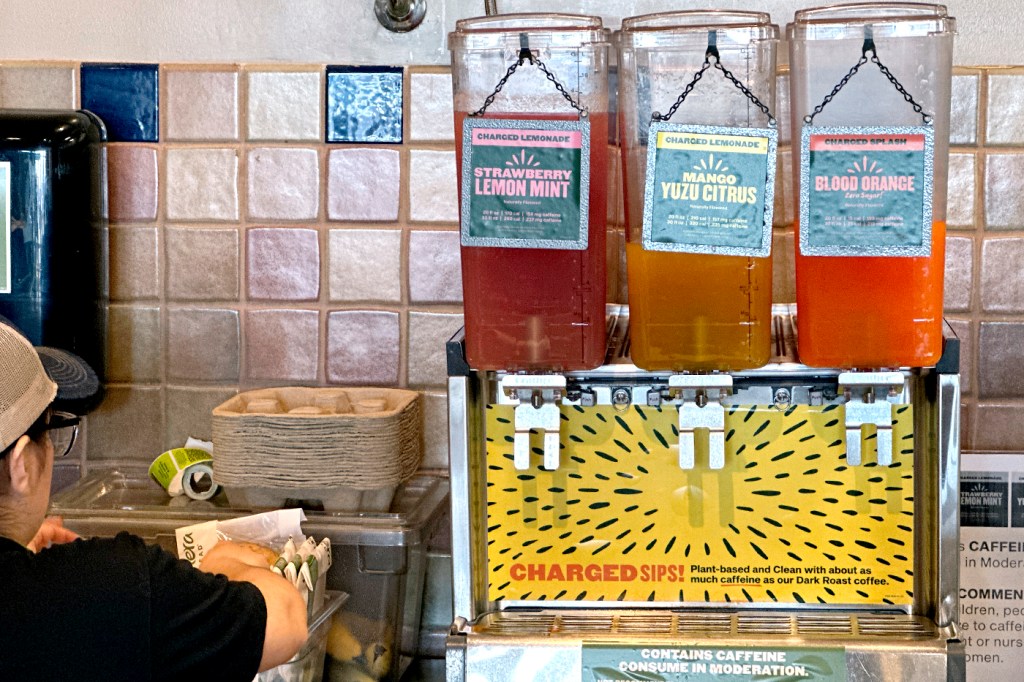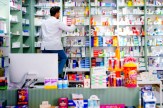Panera Bread is phasing
out its ‘Charged Lemonade’ drinks.
Why consuming too much caffeine
can be dangerous
Panera did not reference lawsuits filed by the families of Sarah Katz and Dennis Brown. The company said the decision was part of a “menu transformation,” which would focus on “low sugar and low-caffeine options.”

Panera Bread announced Wednesday that it’s phasing out its highly caffeinated “Charged Lemonade” drinks that have been blamed for the deaths of at least two people.
In a statement, Panera did not reference lawsuits filed by the families of Sarah Katz and Dennis Brown. The company said the decision was part of a “menu transformation,” which would focus on “low sugar and low-caffeine options.”
The U.S. Food and Drug Administration says the average adult can safely consume 400 milligrams of caffeine a day — the equivalent of four or five cups of coffee.
The “Charged Lemonade” drinks contain up to 390 milligrams of caffeine, according to Panera’s website. In contrast, Red Bull says one of their 8.4 fluid ounce cans has 80 milligrams of caffeine.
Would the average American adult assume that Panera is selling you a lemonade that could have that much caffeine in it? I would be willing to imagine the answer is no.”
Darin Detwiler, a food safety expert and associate teaching professor at Northeastern
Caffeine is a stimulant, says Adam Woolley, a clinical professor and director of assessment at the School of Pharmacy and Pharmaceutical Sciences at Northeastern University, meaning people can get addicted to it and experience side effects.
“The average healthy person can be pretty confident in taking caffeine safely in reasonable doses,” Woolley told Northeastern Global News after the parents of Katz filed a lawsuit against Panera Bread in October.
“We can’t say caffeine’s going to do this or that,” Woolley says. “It’s really on an individual basis.”
Katz had a cardiac arrhythmia that made her sensitive to caffeine. The lawsuit alleges that Panera did not adequately label the “Charged Lemonade” beverage as an energy drink, according to CNN.
In December, a second lawsuit was filed by Brown’s family. It claims the Florida man — who had high blood pressure, a chromosomal deficiency disorder, a developmental delay, and a mild intellectual disability — died of a cardiac arrest after drinking three “Charged Lemonades.”
Woolley recommends that people be mindful about the caffeine content in the beverages they drink and their own reaction.
“You go to Dunkin’ Donuts or Starbucks and get a grande or (large) and those are (equivalent to) more than one cup of coffee,” Woolley says. “You’re looking at two or three there. … A cup of coffee is usually 8 ounces (or) 240 milliliters. That’s approximately half of one of those Poland Spring water bottles somebody might purchase. That’s a cup of coffee.”
About a week after the Katz’s suit was filed, Panera reportedly added “enhanced” disclosures around the beverage, stating it should be consumed in moderation and that it’s not recommended for people sensitive to caffeine, as well as pregnant or nursing women.
Darin Detwiler, a food safety expert and associate teaching professor at Northeastern, says calling a drink “charged” may not be considered a strong enough indicator that this is a highly-caffeinated beverage.
“If you called it ‘Monster drink lemonade’ or ‘energy drink lemonade,’ it would be more clear that there’s potential for it to have the contents of an energy drink in it. But charged lemonade does not … communicate necessarily that there’s that much caffeine in it,” Detwiler told Northeastern Global News.
“In the court of law, it comes down to the average American adult. Would the average American adult assume that Panera is selling you a lemonade that could have that much caffeine in it? I would be willing to imagine the answer is no.”






